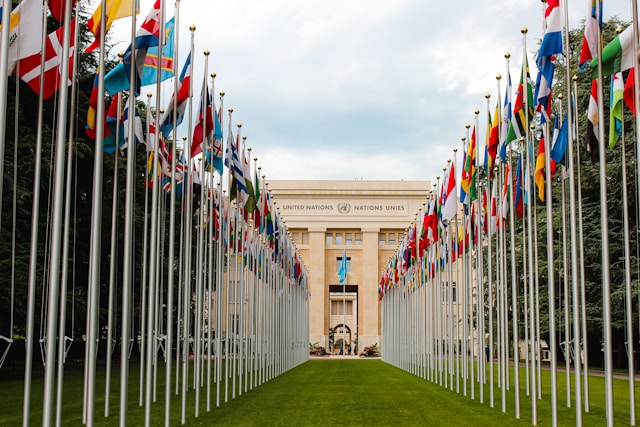Strengthening democracy by reducing threats to women in politics
Hannah Phillips publishes a new report on threats to women in politics around the world, with Agostina Bergia and Rosario Grimà Algora, with recommendations on what we can do about it.

Representative democracy is under threat from growing violence against politically active women. We are in danger of creating a cycle where threats suffered by women discourage other women from participating in politics. Burgeoning research shows that online violence – from image-based abuse to rape threats – is a daily reality for women politicians on different levels of government across the world. For example, the Inter-Parliamentary Union found that 82% of surveyed women parliamentarians had experienced psychological violence and 26%, physical violence.
What can we do about this, and how can we keep pace with the changing nature of the threats that women are facing? From a recent discussion of the report with a group of experts, including an Assistant Chief Constable, politicians, and civil society representatives, five themes are worth noting: the importance of a gender-specific legislative agenda; a focus on implementation of key policies as well as regulation; specific regulation of social media companies; the role of political parties in enabling and regulating violence; and further consideration of the motives of perpetrators.
How can laws set the stage for progress?
A gender-specific legislative agenda is key to addressing this gendered problem. As pioneered by Bolivia and others in the Latin American context, governments should consider adopting specific, stand-alone laws to address violence against women in politics. The creation of such laws practically and symbolically shifts the burden from the individual to positive obligations on the part of the state. Experts emphasised that, such a law, or the amendment of other relevant laws, force different actors, such as social media companies and political parties to take action in cases of violence against women in politics.
Of course, legislation is only as good as it is implementation. It took over ten years to prosecute the murder of the politician which prompted the first stand-alone law on violence against women in politics in Bolivia. This example points to the need for proper resourcing and gender-specific training for those involved in all stages of law enforcement – from police to prosecutors to judges. Even when training is offered, it needs to be implemented with the support and leadership from senior officials.
Government regulation of technology and social media companies is essential to promoting a healthy internet and ending violence against women. Platforms must have an enforceable legal responsibility to address violence such as through authenticating images and videos and improving content moderation. Agile, cultural and context-specific moderation systems are needed to stay ahead of transnational perpetrators who quickly invent new ways to abuse powerful women online. Improved collaboration between regulators could also help effectively hold platforms to account – for example, information commissioners and human rights commissioners could share their retrospective technology and gendered expertise in order to address tech-facilitated gendered violence.
As well as technology companies, political parties have a key role in both perpetrating and stopping violence against women in politics. Research indicates that much of the violence experienced by women politicians around the world occurs inside their own political parties, perpetrated by party members and even other politicians. Experts reflected on the persistent misogynist culture in political parties across the ideological spectrum. Examples of violence range from male politicians ignoring their female colleagues to physical assault. Roundtable participants discussed the possibility for further regulation of political parties, perhaps with more powers to electoral commissions or another independent body.
A final takeaway was the need to better understand perpetrators. While much research has valuably focussed on the perspectives of victims, more scholarship is needed to understand the individual and cultural motives and facilitating factors that leads to people abusing women in politics. With a strong evidence-based of the complex reasons for such violence, we can create effective solutions. For example, comprehensive digital and media literacy may be needed to prevent online violence.
How can we strengthen democracy for all?
A clear message from the roundtable is that addressing gendered political violence is not only a women’s issue but is about strengthening democracy for all. As Dean Ngaire Woods recently warned in an op-ed, if we do not act now, in this important election year, “representative democracies will become less representative and less democratic”. The report and roundtable are contributions to the much-needed conversation about reducing threats to women in politics.
We are very grateful that the Alfred Landecker Foundation has agreed to continue supporting this project, which will allow us to further understand the barriers and opportunities for the implementation of the fifteen recommendations identified in our initial report by engaging with key stakeholders and conducting original research. We will conduct case studies on countries that have implemented specific laws to address violence against women in politics, track changes in social media companies’ policies and compare the policies of political parties. We look forward to continuing this work in partnership with the experts in the roundtable and beyond to safeguard democracy and reduce threats to women.
Hannah Phillips is a Research Associate at the Blavatnik School of Government. For more information about the ‘Strengthening Democracy by Reducing Threats to Women in Politics’ project at the University of Oxford, please contact Ngaire Woods or Hannah Phillips.
This project is generously supported by the Alfred Landecker Foundation and HateAid.

